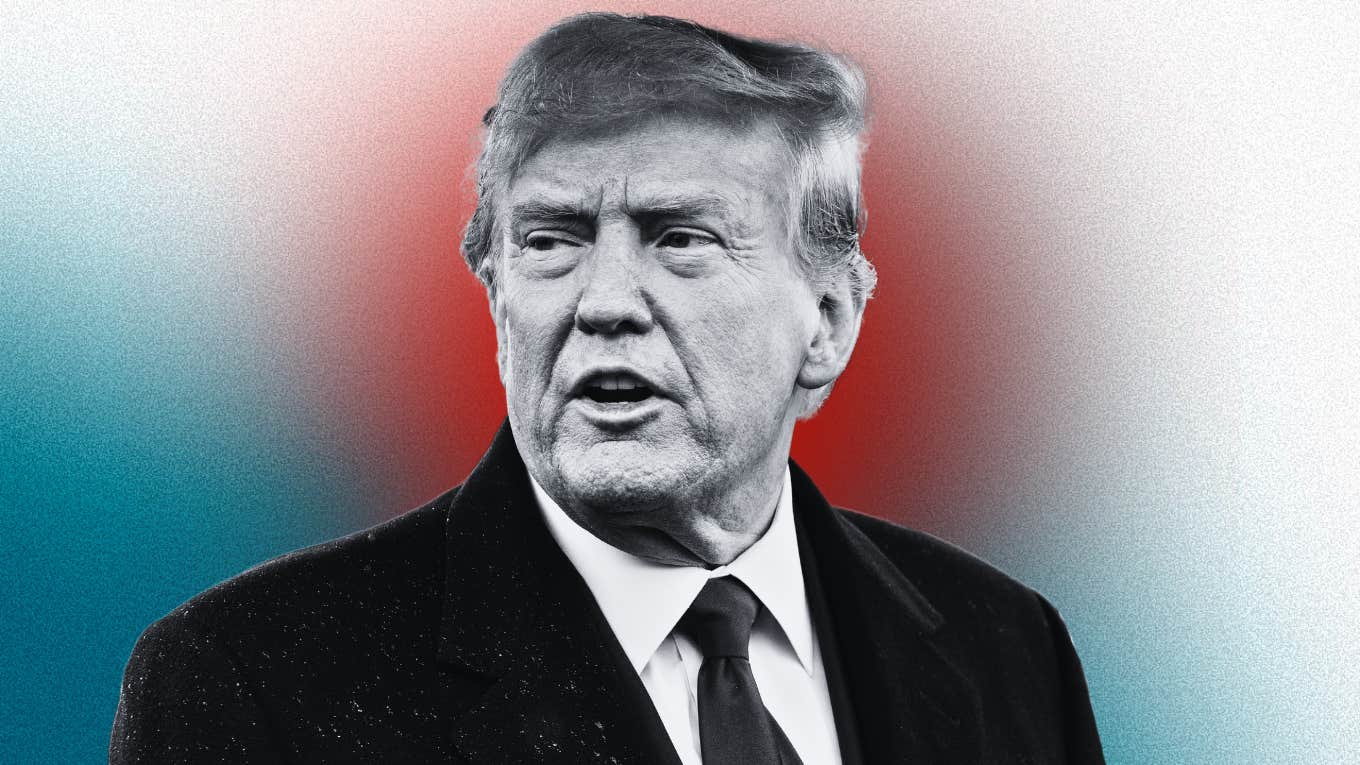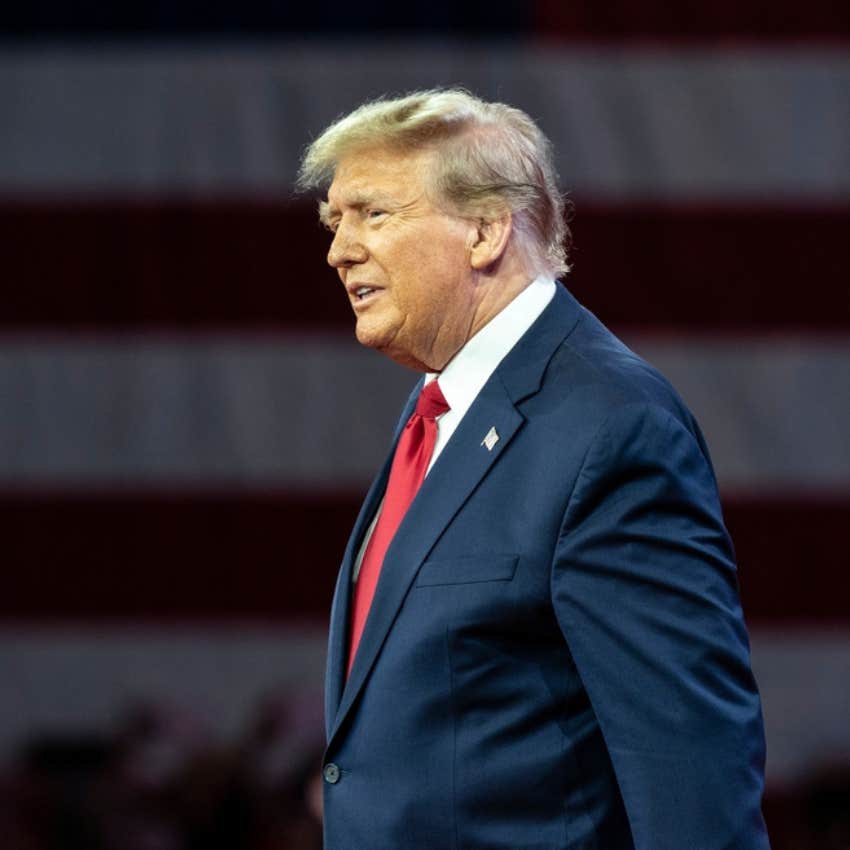It’s Odd That You Can Be So Criminal That You Can’t Vote, But Not Criminal Enough To Not Be The Thing Being Voted On
It's a mad, mad world.
 Lev Radin via Shutterstock / OneRz and Belive Tec CV via Canva
Lev Radin via Shutterstock / OneRz and Belive Tec CV via Canva Former President Donald Trump is now a convicted felon, as a New York jury found him guilty on all 34 counts of falsifying business records in the first degree on May 30, 2024.
Trump stated that the trial was rigged and that “the real verdict is going to be November 5 by the people.”
No matter where your political affiliations lie, the fact that a felon can run for federal office has a distinctly American feel to it: If you can pull yourself up by your bootstraps, you can do anything, even if you’ve been convicted of a crime.
It’s odd that a person can be so criminal that they can’t vote but not criminal enough to be barred from being president.
While there are state laws dictating that a convicted felon can’t run for office, those provisions only apply to state and local candidates.
Derek Muller, a law professor at the University of Iowa, noted that “A state cannot prohibit indicted or convicted felons from running for president.”
That salient legal tidbit was echoed by Barbara L. McQuade, a law professor at the University of Michigan and former U.S. Attorney. "A criminal conviction does not prevent a person from running for president,” she said. "The Constitution controls this question, and it makes no prohibition. States can decide their own rules for who is eligible to hold office within their own states, but they cannot disqualify someone from running for president."
According to the Constitution, the only qualifications for being president in the U.S. are citizenship, age, and residency.
Trump is a 77-year-old American citizen who declared residency in Palm Beach, Florida, making the move from his native New York to his isolationist palace in Mar-A-Lago in 2019.
It’s possible that Trump will be denied the right to vote, even though he's the person who’ll be voted on.
Voting rights for felons vary state by state, and they’re often intentionally confusing in an effort to discourage people from accessing their civil liberties.
 lev radin / Shutterstock
lev radin / Shutterstock
In Florida, felons lose their voting rights until they’re finished serving their sentence, which includes “prison, parole and/or probation, and [paying] the money you were ordered to pay by a court when you were convicted.”
After your sentence is completed, your voting rights are restored unless you were convicted of murder or a felony sexual offense, in which case, you need to apply for clemency to get your voting rights back.
According to the ACLU of Florida, if you were convicted of a crime outside of Florida, your voting rights are governed by the state where you were convicted.
Donald Trump’s voting rights depend on New York’s laws.
Since May of 2021, the NYCLU states that “All New Yorkers who are incarcerated after a felony conviction have their voting rights immediately and automatically restored upon release from prison, whether or not they are on parole.”
New York law holds that convicted felons are not allowed to vote if they’re incarcerated, which means Trump will only lose his vote if he’s in prison on November 5, 2024.
“Former President Trump would, therefore, need to be actually incarcerated during the time of the November election to lose his ability to vote,” said Neil Volz, the deputy director of the Florida Rights Restoration Coalition.
Many legal experts believe prison time is unlikely for our first felon, former president, as his crime was nonviolent and it was his first offense.
While it’s striking that Trump’s conviction comes with so few actionable consequences, it’s not entirely surprising, given our country’s history and habit of awarding privileges to certain people while systematically denying them to others.
There’s an extreme double standard, as noted by content creator Conscious Lee, who shared that his grandma, father, and mother are all convicted felons.
Their sentencing “changed their life forever,” he said. “It made it where there were certain opportunities, accessibility, and resources they could no longer put their hands on because they’re a convicted felon.”
“A lot of jobs in this country would make it where you’re no longer eligible for that job, ‘cause you have a convicted felony,” Lee said. “The fact that this man has 34 of them and still is able to run for Commander in Chief of this country, it really makes me feel some type of way.”
It’s impossible to travel back in time to ask the Founding Fathers what they were thinking when they drafted the document that our entire country’s political system was built upon.
As Barbara McQuade noted, "The drafters of the Constitution never imagined that anyone would run for president after a criminal conviction or that anyone would vote for them.”
It might seem like an oversight on their part to not have built safeguards protecting the most powerful political position in the U.S. from being occupied by someone who committed a crime.
We live in a world where over half of federal prisoners are incarcerated due to non-violent crimes. While they lose their freedom, access, civil rights, and future, someone like Trump can seemingly do whatever he wants, even run the country.
Alexandra Blogier is a writer on YourTango's news and entertainment team. She covers social issues, pop culture, and all things to do with the entertainment industry.

